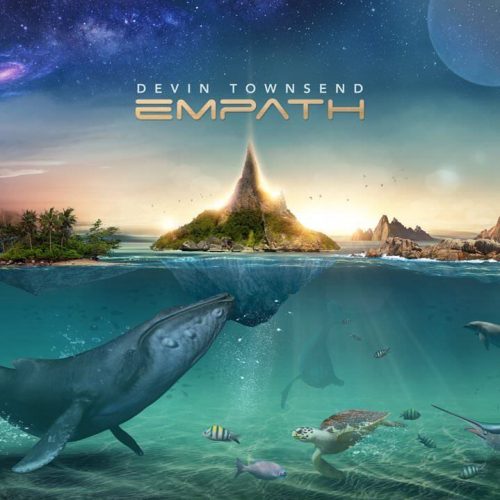I have an affinity for saying things that get me into trouble; things like, “Devin Townsend is the only progressive metal performer out there today.” This should not be taken as a swipe against many of the artists currently working who fall under the prog metal banner. Several of the recent albums I’ve heard are good to excellent, but make no mistake. They are metal albums. They may have weird time signatures and have lyrics about aliens, robots, and beings escaping from the Internet, but there’s little that represents progress or even risk.
With his latest album, Empath, Devin Townsend warned his longtime fans (and I paraphrase here), “Some of you won’t like it. Some of you will be very confused by it. Some of you will be alienated by it.” Even with the looming promise of hordes of followers turning back to find someone else to stalk, Townsend pressed on. Why? Because he felt he had to.
This causes Empath to be the most thorough expose of Townsend’s psyche at this moment, a single room where all of his many sides duke it out for the future of his creative (and in many ways, personal) life. In this corner, you have the side that once masterminded the monstrously heavy band Strapping Young Lad. In the other, you have the ethereal country/folk of Casualties of Cool. Townsend seemingly wrestles with focusing on hooks and the big, epic sounds which typified the latter Devin Townsend Project albums while concurrently staving off tendencies to burn it all to the ground. This record then dares to go one step farther than you imagined, and then goes farther still.
So yes, the front half of the record eases you into the new deal, delivering some of Townsend’s most brutal work in years, bolted into some of his most chill work, and sometimes these are in the same song.
Now that you’re on Townsend’s level, you can appreciate the big leaps, like “Why,” an orchestral, near-operatic composition with glancing metallic touches. The bravura of the track raises the hair on one’s arms, and just like that, it’s over and you hear a crowing rooster. This is the 11-minute “Borderlands,” which will pull you through several new soundscapes, always unexpected, but never boring.
“Requiem” goes a million miles past “Why” and presents a full, orchestra and choral piece, a lead-in to prepare you for the 23-minute “Singularity.”
Taken as a whole, the record exhibits a fearlessness you don’t get from…well, anyone anymore. Some will sniff and say that it is “false metal.” Others will shout “arrogant pretension.” I don’t agree with these opinions. These are the charges leveled at artists all the time when they try to get out of their genre boxes. What results is a fear from the artists, managers, and record labels of rocking the boat too much, turning out records that cling for dear life to some dusty presupposition of “authenticity.”
Or scorned fans who counted on you to deliver the same thing over and over in a slightly new way just call you a sell-out. That happens a lot, too.
Townsend knew he’d get those reactions, but Empath is hardly a sell-out. The collection is undeniably weird, but in such a way that it draws you back again and again until you have the ability to hear past the anachronisms to appreciate the links and themes (and there are several).
A primary theme is simply to live a good and worthwhile life. This comes back time after time in the songs, that there needs to be a harmony to living within this ecosystem – a most selfless act – while wanting to be at peace and content with yourself, an inherently selfish or self-preservationist act. When trying to live on both sides of this road, you’re going to lose sight of the times you got it right, and dwell on the times you utterly screwed it all up. Letting it go is not to reject responsibility in deference to ignorant bliss, but to examine it, recognize that letting it pass is a step to growth (and sure, progress), and then actually allowing yourself to grow.
Blah, blah, blah. There are moments on this record that will melt your face off.
Townsend’s collaborators on Empath are just as varied, a stream of musicians who have been with him through important periods of his career including his former Vai Band boss Steve Vai, DTP cohort Anneke Van Giersbergen, Casualties partner Ché Aimee Dorval, and fellow Canadian Chad Kroeger. Yes, that Chad Kroeger. I suppose we have to give up spreading all the nasty anti-Nickleback memes now. All of them bring their skill and talent to the room, but the table is unmistakably Townsend’s, and the resulting meal is his and his alone.

Should you buy this? As I said up top, I like saying things that get me into trouble, and in this case I am classifying you as a definite “maybe.” Do you like a level of assurance, even predictability in your music? Do you lose patience should the steps not neatly go from A to B to C? Should the ten or so tracks be so unified to not invoke any sudden shocks in you when the color palette shifts radically? If you answered “yes” to any of these, then do not bother. You’re not equipped to handle Empath, even in its most crowd-pleasing moments.
But if you have been waiting for a record that exhibits the kind of guts that heavy music only occasionally comes close to, and the same amount of guts to go 180 degrees away in the other direction, and demand something from you, dear listener, beyond a passive amused appreciation, then maybe you’re ready for it.
This album left me rattled, sometimes spellbound, sometimes perplexed, but all of these feelings were evoked purposefully. They are the correct response to this particular stimuli, and examined as a whole, Devin Townsend is the most progressive – maybe the only progressive – musician in prog metal today. Going forward, every other person who works in this subgenre has a very steep mountain to climb.
